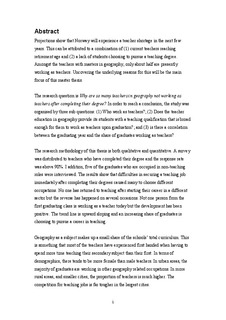| dc.description.abstract | Projections show that Norway will experience a teacher shortage in the next few years. This can be attributed to a combination of (1) current teachers reaching retirement age and (2) a lack of students choosing to pursue a teaching degree. Amongst the teachers with masters in geography, only about half are presently working as teachers. Uncovering the underlying reasons for this will be the main focus of this master thesis.
The research question is Why are so many teachers in geography not working as teachers after completing their degree? In order to reach a conclusion, the study was organised by three sub questions: (1) Who work as teachers?; (2) Does the teacher education in geography provide its students with a teaching qualification that is broad enough for them to work as teachers upon graduation?; and (3) is there a correlation between the graduating year and the share of graduates working as teachers?
The research methodology of this thesis is both qualitative and quantitative. A survey was distributed to teachers who have completed their degree and the response rate was above 90%. I addition, five of the graduates who are occupied in non-teaching roles were interviewed. The results show that difficulties in securing a teaching job immediately after completing their degrees caused many to choose different occupations. No one has returned to teaching after starting their career in a different sector but the reverse has happened on several occasions. Not one person from the first graduating class is working as a teacher today but the development has been positive. The trend line is upward sloping and an increasing share of graduates is choosing to pursue a career in teaching.
Geography as a subject makes up a small share of the schools’ total curriculum. This is something that most of the teachers have experienced first handed when having to spend more time teaching their secondary subject than their first. In terms of demographics, there tends to be more female than male teachers. In urban areas, the majority of graduates are working in other geography related occupations. In more rural areas, and smaller cities, the proportion of teachers is much higher. The competition for teaching jobs is far tougher in the largest cities.
None of the respondents are regretting their decision to pursue a teaching degree. They express that the pedagogical competency is extremely versatile and useful in all of their diverse occupations. They highlight the ability to take the lead in meetings and the skill of public speaking as the key takeaways from their education at NTNU. | nb_NO |
